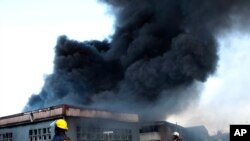This month’s riots across South Africa have underscored concerns about inequality and stability after nearly three decades of democracy. In Soweto, owners of pillaged shops accuse the government of failing them.
Mahamadali Randera watched helplessly from outside his electronics shop at a strip mall in Soweto as determined looters broke through its heavy metal gate.
In a matter of hours, his livelihood of the past seven years disappeared.
Neighboring shops were also emptied before the one-story building was torched.
Nationwide, losses from the unrest that overwhelmed police, destroyed infrastructure and halted local economies are estimated in the billions of dollars.
Small business owners like Mohamadali Randera in Soweto are left asking authorities: why?
“I’m really disappointed in this government," said Randera. "Why the government can’t open up their hands and do this targeting these people who are do this nonsense because not only my shop, there’s a million people who lost their business.”
Experts say the riots were an eruption of frustrations that have long been simmering among South Africans.
Extreme inequality has persisted since the ruling party — the African National Congress — was first elected in 1994.
Nelson Mandela University’s Hlengiwe Ndlovu says although it brought freedom to the nation, the ANC has since failed to deliver for the poorest.
“We’re seeing now post 1994, we have a different governance with a different face, but the conditions pretty much are more or less the same... People are angry, people are hungry and they want to take out this frustration,” Ndvolu said.
President Cyril Ramaphosa announced this week the return of a social grant for those who have lost their jobs during COVID-19 lockdowns.
Uninsured business owners like Randera can also expect funding.
But Johannesburg-based international relations expert Leaza Jernberg says the response has yet to restore public confidence in the state.
"There is some frustration that everything moves too slowly and that we hear lots of wonderful promises but if you’re not actually going to carry them through then what’s the point?,” Jernberg asked.
Divisions within the big-tent party are also festering while allegations of corruption under former President Jacob Zuma’s administration mount.
But voters are left with few alternatives. Jernberg said opposition parties fail to attract broad support by being too radical or appealing to old racial and ethnic ties.
And yet, Jernberg says the unrest may have also revealed the strengths of the country’s democracy.
"The constitutional court held firm, the different people in civil society and the institutions came out in support of the court and despite the unrest, President Zuma remains in prison, which has to be seen as a triumph for the rule of law,” Jernberg said.
The country is now closely watching how the law is being enforced on those involved in the riots.
More than 25-hundred people have been arrested, six of whom face charges for inciting violence. The government has said more arrests are expected.






